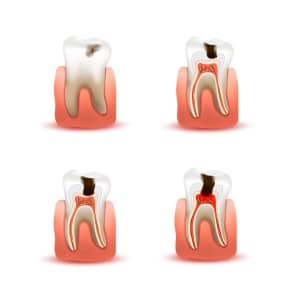Root Canal in Owensboro & Beaver Dam, KY
A root canal procedure is often a straightforward procedure to save your teeth and relieve dental pain. Patients often require a root canal when there is infection or inflammation in the roots of a tooth.
What Is a Root Canal?
The root canal procedure is used to repair and save a badly infected or decayed tooth. During your root canal treatment, our dentist in Owensboro and Beaver Dam KY, Dr. Travis Wilson DMD, removes the pulp and nerve and cleans and seals the inside of your tooth. If you don’t receive this treatment, the tissue that surrounds your tooth can become infected and could form abscesses.
Signs You Need a Root Canal
From genetics to a cracked tooth from injury to problems with a previous filling to a deep cavity, there are a number of reasons why you’d need a root canal. An early sign that patients may require a future root canal is when they start to notice their teeth becoming sensitive, especially to cold and hot sensations.
Some signs you may require a root canal are:
- Pimples on your gums
- Serious pain while you bite or chew
- Tender or swollen gums
- A cracked or chipped tooth
- Darkening of your gums or deep decay
- Lingering sensitivity to cold or hot even after the removal of the sensation
Is a Root Canal Painful?
Since Dr. Wilson will provide you with anesthesia, you shouldn’t experience any more pain than you would with a standard dental procedure, like having a wisdom tooth removed or getting a filling. But, the area involved in a root canal is typically a bit numb or sore after the procedure, and you may even experience some mild discomfort for several days.
How Does a Root Canal Save Your Tooth?
Dr. Wilson removes the infected or inflamed pulp and then carefully shapes and cleans the inside of your root canal. He will then fill and seal the space. You will then come back to see him afterward so he can place a crown or another type of restoration on your tooth to keep it protected and restore it to full function. Following your restoration, your tooth should continue functioning like any other tooth.
What to Expect During a Root Canal Procedure?
It can take one or two visits to fully complete an endodontic treatment and it involves some steps:
- Dr. Wilson uses x-rays to examine and take a radiograph of your tooth. He’ll then administer local anesthetic. Once your tooth is numb, he’ll place a small “dental dam” (small protective sheet) over the area which isolates your tooth, keeping it free of saliva and clean during the procedure.
- Dr. Wilson makes an opening in the crown of your tooth. He’ll use small instruments to clean the pulp from the root canals and pulp chamber and for shaping the space for your filling.
- After he cleans and shapes the space, he’ll fill the root canal with a type of biocompatible material, typically a rubber-like material known as gutta-percha. He places this material with an adhesive cement to make sure it completely seals your root canal. Often, he’ll place a temporary filling to close the opening, which he’ll remove once he’s ready to restore your tooth.
- After your final visit with Dr. Wilson, you will need to return to his office in Owensboro & Beaver Dam KY to have him place a crown or another restoration on your tooth, protecting it and restoring it to full function. If your tooth lacks sufficient structure for holding the restoration firmly in place, Dr. Wilson might place a post inside your tooth.
Root canals have an over 95% success rate and can even last a lifetime. To ensure your root canal lasts as long as possible, you’ll want to receive a permanent restoration (crown or filling) on your tooth right away after your root canal and practice great oral hygiene.
Even if you have a root canal, your tooth can still get a cavity, so you’ll want to be sure you’re brushing and flossing the tooth thoroughly to ensure it stays healthy. Because there’s no nerve in your tooth, you won’t experience any symptoms if you do end up with a cavity. You’ll only experience pain if the tooth becomes fractured or if it ends up with another abscess around it. Dr. Wilson will want you to come in regularly for a check up to check your tooth for signs of failure or reinfection.
Prevention
To prevent tooth decay, infections, and gum disease, Dr. Wilson recommends:
- Using a fluoride toothpaste
- Brushing your teeth in the morning and right before bedtime
- Flossing in between your teeth for preventing plaque buildup
- Using an ideal toothbrush and regularly replacing it
- Following a healthy diet and avoiding sugary foods and beverages
- Asking about dental sealants which could also prevent decay
The best option is saving your natural tooth, therefore a root canal procedure is typically the treatment of choice. There really is only one other alternative to a root canal — a tooth extraction and replacing your tooth with a bridge, implant, or denture. These are more costly procedures than a root canal and frequently require additional procedures and more time. If you do have your tooth extracted and it’s not replaced with a restoration, it can impair your chewing function and your teeth could shift.
If you’re thinking about a root canal for saving a tooth, it’s important you find a trustworthy dentist. Dr. Wilson serves clients in the greater Owensboro area, which includes surrounding areas like Beaver Dam and Morgantown. Set up your root canal appointment today.

